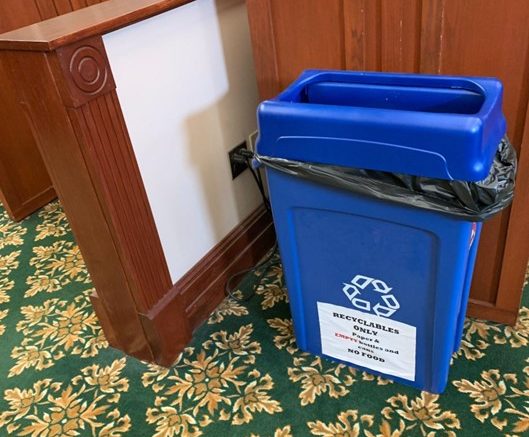By Megan Churchill
Reduce, reuse, recycle: These are three words we hear a lot if we’re attempting to live sustainably.
Recycling bins on Flagler College’s campus are hard to come by, but according to some environmental leaders of the Flagler community, reducing and reusing are far more sustainable practices than recycling.
“We’re trying to get a recycling system going on campus. The issue with recycling on campus is that St. Augustine is actually really just horrible…” said Carly Shaw, Flagler College Junior and president of the Natural Sciences Club at Flagler.
Currently, the city of St. Augustine doesn’t recycle any form of glass and the restrictions on how materials can be recycled are high. Shaw said the Natural Sciences Club is focused on promoting sustainability on campus in multiple ways.
Though increasing recycling on campus is ultimately a goal of theirs, she said part of the issue with recycling in general is the lack of education on how to properly dispose of recyclable materials. Shaw mentioned the specific requirements for materials: fully cleaned out bottles and cans, removed caps and other materials from bottles, and only plastics labeled “1” or “2”.
“I feel that there’s not enough education about proper recycling… people don’t know the numbers that can be recycled,” Shaw said.
She said there are many things we can do to increase our sustainability.
Avoiding single use plastics, being aware of water consumption, and using alternative modes of transportation, are all ways Shaw said we can increase sustainability. She also mentioned the negative impact of food waste.
“I think it would be really cool if our school had a composting system. Food waste is one of the biggest issues that we’re facing, and you know food can’t biodegrade when it’s sitting in a plastic trash bag in a landfill, and that just releases more methane gasses and contributes to climate change,” Shaw said.
She said the Natural Sciences Club is focused on educating people about how to decrease their footprint.
In addition to this education, increased campus access to recycling is something Shaw said the club is working towards, but she expects it will take a continual effort over the coming years.
She said a challenge to increasing recycling is that it takes money to implement a large-scale recycling system and agreement from the President and board of trustees.
On campus, confidence around the current recycling system is not high.
“The only one [recycling bin] I know of is downstairs first floor of the library,” said Fina Foster, a Flagler College Junior.
“But I don’t know if that’s actually being recycled,” she added.
I spoke to Jessica Veenstra, Flagler College Natural Sciences Department Chair and she said, “I think sustainability and recycling are a challenge everywhere. Recycling is a great idea… but it’s really difficult to implement.” Veenstra said in general, attempts at recycling are not always successful and the majority of what is recycled ultimately ends up in the landfill.
Veenstra said that what materials can be recycled changes with the market. Like Shaw, she said more important than recycling is reducing consumption and waste.
“On a more broad scale, you know, thinking about can you buy fewer things, just because most things end up in the trash eventually,” said Veenstra.
It takes more than recycling to live sustainability, and Veenstra said asking ourselves what we can do to reduce waste in our lives is important.
“I think recycling makes us feel better about just doing our lives as is: If we just throw it in this blue bin we feel good, but the reality of that blue bin is, it’s not doing very much.”




Be the first to comment on "Recycling on Flagler’s Campus: Not the Key to Sustainability"